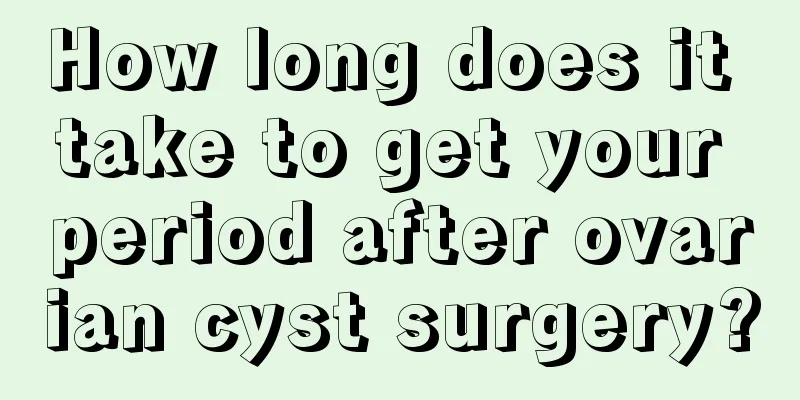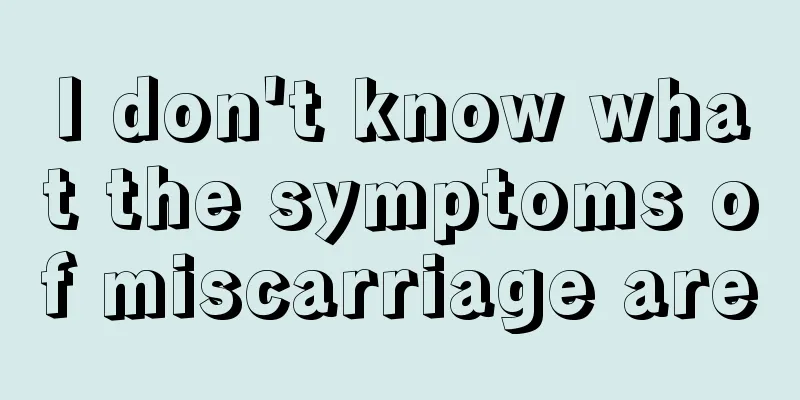How long does it take to get your period after ovarian cyst surgery?

|
Generally, menarche will occur within three months, but each person is different and the body conditions are different, so there is no fixed time. If you do not have your period after three months, you should go to the hospital for a physical examination to find out the cause and then deal with it. Treatment of ovarian cysts. When treating ovarian cysts, we must consider the patient's age, whether the cyst is malignant, and the location, volume, size, and growth rate of the cyst. In addition, whether the fertility function is preserved and the patient's own subjective wishes should also be considered. The vast majority of ovarian cysts are benign, so surgical treatment should not be performed blindly. The treatment of uterine and ovarian cysts is as follows: 1. Good cyst treatment (1) General medical treatment If it is a simple cyst, without septa, intracystic papillae, thickening and other complex features, it is basically good and can be observed traditionally. The cyst will generally shrink or disappear when you return for follow-up 4-8 weeks later. If the cyst does not subside, but the ultrasound shows that it is still a simple cyst, you can still continue to observe it carefully. For physiological uterine and ovarian cysts combined with endocrine diseases such as menstrual disorders, oral medication can be used to relieve symptoms. However, for physiological cysts, no oral medication with definite efficacy has been found so far. (2) Surgical treatment Ovarian cystectomy is often performed on young patients, especially premenopausal patients, while trying to preserve normal uterine and ovarian tissue. Bilateral salpingo-oophorectomy: For very old (over 45 years old) or postmenopausal patients, one or both sides of the salpingo-oophorectomy can be performed. 2. Treatment of malignant cysts Considering the possibility of malignant transformation or undiagnosed cysts, the removed material should be sent for pathological examination after surgery to determine the characteristics of the cyst under a microscope before considering the next step of treatment. If an ovarian cyst shows complications such as twisting, rupture, bleeding, or infection, emergency surgery should be performed. Most patients are already in the terminal stage when they seek medical treatment. Therefore, during treatment, every effort should be made to remove the primary cyst and visible pelvic and abdominal metastatic lesions. Currently, the uterus and tumor are often removed in one piece behind the pelvic peritoneum, such as removing the greater omentum, part of the intestine, part of the bladder, and the urethra. Consideration should also be given to leaving a flexible tube in the abdomen to facilitate the injection of chemotherapy drugs into the abdomen after surgery. |
<<: How long after taking ibuprofen can I breastfeed?
>>: Diet after ovarian cyst surgery
Recommend
Women must do one thing after urinating
Generally speaking, women's restrooms in publ...
What causes vaginal itching and swelling?
In today's society, the incidence of vaginal ...
How many days of bleeding after a spontaneous abortion means that the abortion is complete?
For women who are pregnant for the first time, if...
Precautions after hysterectomy
The structure of women is very complex. The uteru...
How to remove the earthy smell of freshwater fish
We all know that there are many types of fish, an...
How to tell if you are pregnant on pregnancy test paper
There are many ways to determine whether you are ...
Still have milk after 4 months of weaning
The process of weaning a baby is quite painful, b...
The probability of the gestational sac returning to the uterine angle
Pregnant mothers all hope that their fetuses are ...
What will happen if you drink beer during menstruation? You need to know these five dangers
Nowadays, more and more women smoke and drink, wh...
How many calories do women consume in a day
When it comes to weight loss, it is undoubtedly i...
How to maintain a healthy uterus?
Every woman hopes that her body can be healthy so...
Discharge from below during early pregnancy
Women will undergo great changes after becoming p...
How to conceive faster with polycystic ovary
Patients with polycystic ovary have difficulty ge...
Pregnant women don’t dare take medicine for toothache? Teach you how to treat with folk remedies
All parts of the body will be accompanied by pain...
Why do women like men to hold them when they sleep?
Men and women have different personalities. Men l...









